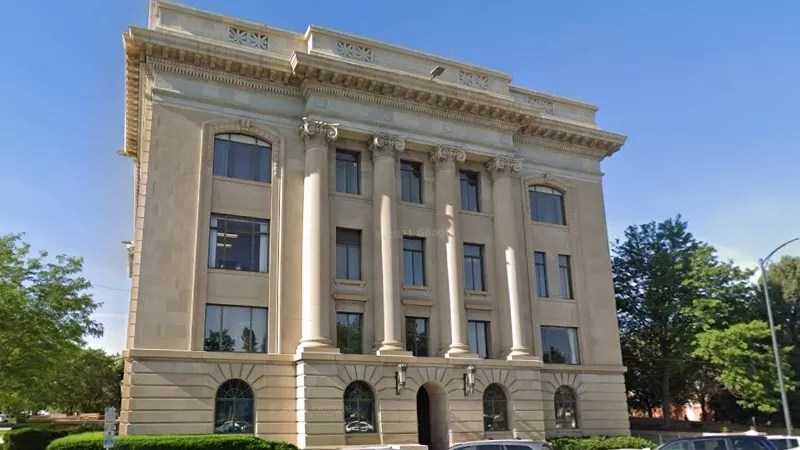
Google Maps

Audio By Carbonatix
The ACLU of Colorado has sent letters to twelve governments around the state demanding that they end what’s characterized as “the unconstitutional practice of barring people with a felony conviction from running for office.”
The recipients of the November 2 missives include offices and officials in Arvada, Brighton, Evans, Federal Heights, Fort Collins, Greeley, Johnstown, Lone Tree, Montrose, Pueblo, Windsor and Weld County, where ACLU of Colorado staff attorney Annie Kurtz has asked Weld County Attorney Bruce Barker to “acknowledge that the Weld County Charter provision violates the Colorado Constitution. In addition, we ask you to take affirmative steps to ensure that this unconstitutional provision does not prevent otherwise eligible candidates from running for local public office” by November 16.
This isn’t the first time that the ACLU has made such a demand. In May 2021, the organization sued the City of Aurora over a section of its charter that prohibited former felons from becoming candidates on behalf of social-justice advocate Candice Bailey, who was seeking a spot on city council. Aurora initially offered to make an exception for Bailey without changing its charter (she eventually finished fourth in a race for two at-large seats), but that wasn’t acceptable to the ACLU, which wanted a court to confirm its legal theory – and in March, an Arapahoe District judge did just that.
“The ruling is a significant legal victory that undermines the validity of similar provisions still in force in jurisdictions all over the state,” Kurtz told Westword after that decision. “These laws exemplify the collateral consequences that attach to criminal conviction, with disproportionate harm to individuals and communities of color. The court’s decision sends a powerful message that formerly incarcerated people are not second-class Coloradans – that they belong on ballots for public office.”
The Bailey filing pointed out what the ACLU of Colorado considered problematic language in several other city charters statewide. Examples pertaining to ten of the communities that received letters:
Arvada City Charter: “No individual shall be eligible to hold the office of City Councilmember, or Mayor, who has been convicted of a felony in any court of the United States within ten (10) years of the date of assuming the office of City Councilmember.”
Brighton City Charter: “No person who has been convicted of a felony shall be eligible to be elected or appointed to the office of Mayor or Council Member.”
Evans City Charter: “A person who has been convicted of a felony shall not be eligible to become a candidate for a City Office.”
Federal Heights City Charter: “No person who has been convicted of a felony or a willful violation of this Charter shall be nominated or elected as Mayor or councilmember.”
Fort Collins City Charter: “No person who has been convicted of a felony shall be eligible to be a candidate for, or hold, the office of Councilmember.”
Greeley City Charter: “A person who has been convicted of a felony shall not be eligible to become a candidate for a City office.”
Johnstown City Charter: “No person who has been convicted of a felony…shall be qualified to serve as Mayor or Councilmember.”
Lone Tree City Charter: “No person who has been convicted of a felony may serve as a Council member….”
Montrose City Charter: “Every elector may be a candidate for the office of Councilor, if he has never been convicted of a felony….”
Windsor City Charter: “No person who has been convicted of a felony shall be eligible to be elected or appointed to the office of Mayor or Board Member.”
In her letter to Barker, Kurtz cites the ACLU’s case against Aurora, noting that the city “immediately conceded the unconstitutionality of its ban; committed not to enforce it; and annotated the charter provision with an ‘editor’s note’ reflecting that the ban must be read to apply only to the felonies listed in article XII, section 4 of the Colorado Constitution all before the ban was formally declared unconstitutional in court. Aurora’s City Council also referred a charter amendment to the voters to remove the voided language ‘to confirm the qualifications of the elective officers with…the Colorado Constitution.'”
Article XII, section 4 states that people “convicted of embezzlement of public moneys, bribery, perjury, solicitation of bribery, or subornation of perjury” are disqualified “from holding office of trust or profit,” but makes no mention of felonies generally.
“We encourage Weld to follow Aurora’s good example and take all available steps to align its charter with the Colorado Constitution,” Kurtz emphasizes, adding, “We would appreciate a substantive response to this letter within two weeks.”
Westword has reached out to Weld County; click to read the ACLU of Colorado’s felony-conviction letter to county attorney Barker.